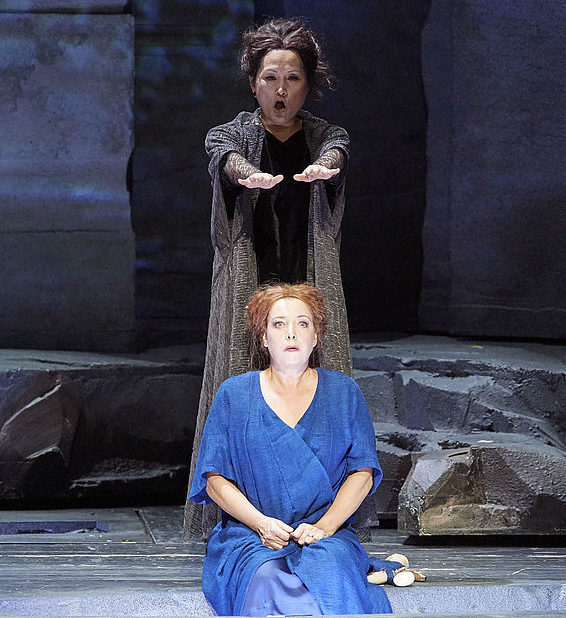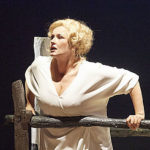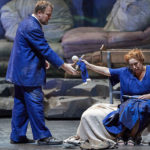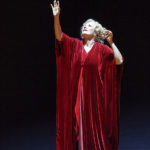 The backstory. Out hunting, the Emperor shoots a gazelle. She’s transformed into a young woman, whom he falls in love with and marries. But she’s the daughter of the Spirit King Keikobad. And she must cast a shadow within twelve months or the Emperor will turn to stone, she returned to her father…
The backstory. Out hunting, the Emperor shoots a gazelle. She’s transformed into a young woman, whom he falls in love with and marries. But she’s the daughter of the Spirit King Keikobad. And she must cast a shadow within twelve months or the Emperor will turn to stone, she returned to her father…
But stop! What is this but a very adult fairytale about a wife, rich, attractive, a ‘goddess’ worshipped by her husband, but whose marriage is barren. Behind the mythology underlying Richard Strauss’s opera (and Hugo von Hofmannsthal’s sophisticated libretto): her husband ‘shot’, wooed, this exotic creature, (who we later find has a father fixation.) The ‘woman without a shadow’ is unfulfilled as a woman; the shadow symbolises her fertility. Now she’s looked after by the Nurse ‘with special powers’… So Vienna’s previous production, set in a psychiatrist’s study, made good sense of this mythological stuff. Also Strauss’s opera premiered here at Vienna State Opera, in Freud’s Vienna of 1919.
In the event, in Vincent Huguet’s new production, Aurélie Maestre’s stage design, doesn’t compare with the luxuriously decadent art deco, jugendstil , of Vienna’s previous. But with a star-studded cast- featuring two of the world’s foremost Straussian sopranos, Camilla Nylund, and Nina Stemme – with Vienna State Opera Orchestra (and Choruses) conducted by Christian Thielemann- musically it was phenomenal. And it really didn’t matter too much about the staging.
This, in Act 1, consists of a summer palace, resembling a bird cage with its dome, the Empress, being like some protected species, her husband’s collectors item.  This ‘conservatory’ is reached by a draw-bridge, on which the Nurse, (exraordinarily gifted soprano Mihoko Fujimura) sings to the Bucklige, steward (tenor Michael Laurenz) of the Empress’s fate, with ‘just three days left to find a shadow.’
This ‘conservatory’ is reached by a draw-bridge, on which the Nurse, (exraordinarily gifted soprano Mihoko Fujimura) sings to the Bucklige, steward (tenor Michael Laurenz) of the Empress’s fate, with ‘just three days left to find a shadow.’
Actually, Laurenz’s tenor is so impressive I first mistook him for the Emperor, sung by Andreas Schager, in a military blazer, holding a rifle, (how he shot her?). Schager, emotional, if a little exaggerated: rhetorical, like a young tenor, bursting, exuberant, against Camilla Nylund’s super-cool delivery. The bridge draws up to emphasise unworldly isolation, remoteness. Flutes, and wind articulate uncanny bird-like sounds, that bird trapped in a cage! (There’s every conceivable wind instrument, a capacity orchestra rarely assembled. You’ve never seen such an orchestra in an opera pit!)
She, Empress, in white, Fujimura’s Nurse, delving with the occult, all in black. It is indeed Nylund, but she looks more capacious, with blonde curls, in a loose white smock. The Nurse, her mentor, seems to be tugging at the train of Nylund’s white gown, as if it were a wedding dress. Nylund’s exquisite, but powerful soprano, especially suited to Straussian roles – Ariadne auf Naxos– is a favourite here. As is Nina Stemme, as the Dyer’s wife, in the sub plot.
 The Dyer’s ‘domain’ is a humble cottage, the set, silver-grey, sheer rock faces with age-old striations. Thomas Konieczny’s Dyer (Farber) Barak wears a royal-blue suit, his baritone unmistakable- against Stemme’s fruity, sensuous tones. Konieczny elicits ever lower notes, grinding musical nuggets to diamond-rich brilliance. Refined, complex, but emotionally loaded- accompanied by Strauss’s horn players. Konieczny sings of his happiness-Ein Gluck – extolling his married bliss, his hopes of a family- to passionate string playing from Thielemann’s orchestra. Stemme, now endangering their marriage, is accompanied by deepest wind instruments, bass-clarinet, bassoons.
The Dyer’s ‘domain’ is a humble cottage, the set, silver-grey, sheer rock faces with age-old striations. Thomas Konieczny’s Dyer (Farber) Barak wears a royal-blue suit, his baritone unmistakable- against Stemme’s fruity, sensuous tones. Konieczny elicits ever lower notes, grinding musical nuggets to diamond-rich brilliance. Refined, complex, but emotionally loaded- accompanied by Strauss’s horn players. Konieczny sings of his happiness-Ein Gluck – extolling his married bliss, his hopes of a family- to passionate string playing from Thielemann’s orchestra. Stemme, now endangering their marriage, is accompanied by deepest wind instruments, bass-clarinet, bassoons.
Nylund’s Empress has descended in a scarlet-red velvet gown, v-neck open; Stemme, auburn-haired, in a blue housecoat, the housewife, has a peasant honesty. Lounging on a white sofa, as if doped, the Nurse and Empress descend on her like predators. Fujimara, spectacular, ruthless, achieves astoundingly high notes. Nylund tenderly pushes Stemme down – in a state of ecstatic expectation, under their spell. It’s the woman’s Faustian pact. What material luxuries, sexual encounters can offer the drab housewife.
The stage is filled with a ‘harem’ of exotically dressed women. Like vamps released from an out-of-time ‘Sex and the City’ cast, with Stemme led blindfolded into temptation. The Nurse leads on a good-looking man in blue – out of her dream closet- with a fabulous tenor to prove what he’s capable of. The women’s chorus look on in awe.
Nylund, reminiscent, physically, of a Glen Close figure,(circa Dangerous Liaisons), is accompanied by Strauss’s eerie, falcon motif. (‘The woman casts no shadow’, sings Maria Nazarova.) The Chorus sing, Mother, Let us in. She has betrayed him, she tells Barak. Shattered, let down, he has no appetite for her food.
Augapfel, sings Stemme, (opening Act 2) Close my eyes, open my heart: she sings of the man in the blue suit, (youthful, gorgeous.) On bounds Konieczny, and the stage is overrun by children in a harvest festival- a celebration of bounty and fertility. They praise the Dyer for his beneficence and humanity. This is the man the Empress is tempting his wife away from.
We hear that falcon leitmotiv – pleading, insistent- the call of the wild, the Empress’s primal origins? The Nurse is a witch figure, her spiritual powers negotiating this magic.
– pleading, insistent- the call of the wild, the Empress’s primal origins? The Nurse is a witch figure, her spiritual powers negotiating this magic.
We see wounded bodies strewn across the stage. Schager’s Kaiser sings of a falcon. His bare hands are not able to do it. Murder her. He suspects the Empress of being unfaithful.
Stemme’s wife, a comely, maternal figure, (but who has not yet born children), her soprano soars voluptuously. The locals taunt her: the woman is dead. She doesn’t cast a shadow! Her eyes are dimmed. I didn’t do it! Not yet, she pleads. Her mouth betrayed her before the deed. (She only spoke of it, selling her shadow). Noble husband, Barak, Higher powers are at work!’ Stemme, phenomenal!
Actually, the grey granite, rock-faced stage (Act 3)- like a barren planet before life bears fruit- is appropriate if unimaginative. The monochrome background to a dreamscape. Perhaps this is the way to make sense of these Ur-myths. The fearful journey of the protagonists- the Empress, and wife-to-be robbed of her womb, bartered for illusory pleasures.
The black stage curtain is down. I didn’t do it, she confesses to her husband, before she ‘dies’. Stemme’s soprano is earthbound, sensual, yet sublime. I wanted to forget him, to flee from his sight, she sings But his face appeared to her before she could. Konieczny sings, he was entrusted to look after her, and cherish her. She returned, ‘to see you, to give you children, dear husband.’ Their duet is quite magnificent, Strauss’s music again lyrical, against the strident, modernist chromaticism. Konieczny, Wife, go up – the way is clear.
Whereas, the Empress in a mysterious scene- perhaps a dream sequence, like a Freudian case study- liberates herself from her father’s ghost. Thunder and lightning, the stage erupts, smoke creeping out. Sterben wir, verloren. A violin solo of immeasurable beauty and poignancy. Nylund: Father! Is that you, threatening me. Look at your child! Her life overwhelmed by his tyranny. She rejects the golden liquid potion. LOVE IS IN ME, she sings triumphantly. She won’t falter. My place is here in the world. (All this is behind the black curtain, lowered to obscure most of the stage. Bad theatre.)
Shattering discord. I will be judged, father approach! Bells rise into a crescendo. He is punished. His heart is turned to stone.
The wife looks to her husband, sings the Emperor. The Empress has shown compassion and self-sacrifice. Becoming ‘human’, she acquires a shadow. And thus the Emperor is saved, also the Dyer and his wife. Unborn children (Vienna Opernschule) sing, nothing threatens you. See mother, the terror that led you astray. Now heavenly messengers, release the children not yet born… It’s a ‘fairytale’ ending. The Empress is ‘cured’, both marriages are reconciled.
With such high musical values, one could forgive the dismal staging, even the third Act black curtain, a cop-out. Thielemann, inspired, conducted some of the greatest living Straussian singers, and Vienna State Opera Orchestra, supreme in Strauss. © P R. 18.12.19
Photos: Nina Stemme as Dyers wife and Mihoko Fujimura, Nurse; Camilla Nylund as Empress; Tomasz Konieczny as the Dyer, Nina Stemme, Dyers Wife; Camilla Nylund, Empress
© Wiener Staatsoper/ Michael Pöhn

Good web site! I truly love how it is easy on my eyes and the data are well written. I am wondering how I could be notified whenever a new post has been made. I’ve subscribed to your RSS which must do the trick! Have a nice day!